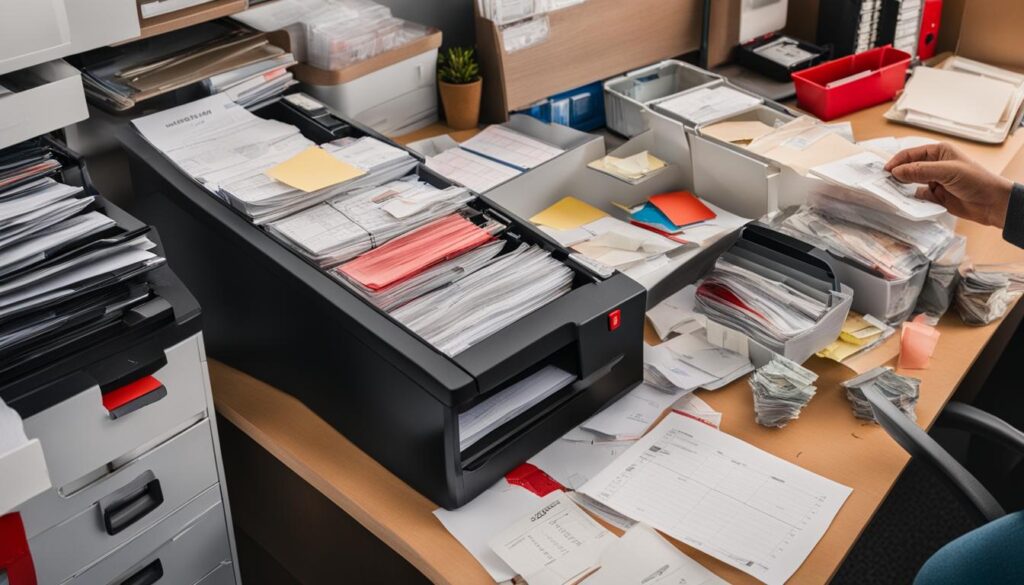Spring is the perfect time to give your finances a refresh. As the season of new beginnings and fresh starts, it’s an ideal opportunity to take a close look at your financial situation, reevaluate your budget, and make positive changes. By implementing a few simple steps, you can streamline your finances, improve your financial health, and set yourself up for success.
In this budget guide, we will provide you with 7 simple steps to spring clean your finances. From decluttering your wallet to reevaluating your budget and establishing financial goals, these steps will help you gain control over your money and achieve greater financial stability. With tax season upon us, it’s even more crucial to take charge of your finances and make informed decisions.
Key Takeaways:
- Spring is the perfect time to refresh your finances and make positive changes.
- Declutter your wallet and purse to start your financial checkup on the right foot.
- Reevaluate your budget to identify areas where you can save money and make adjustments.
- Establish a weekly finance routine to stay organized and on track with your budget.
- Set clear financial goals to keep yourself motivated and focused.
Step 1: Declutter Your Wallet…and Purse (An Easy Spring Clean Your Finances First Step!)
Start your budget refresh by decluttering your wallet and purse. Get rid of unnecessary receipts, business cards, and other clutter. Organize your gift cards and trade in any you won’t use. This step will help you start your financial checkup on the right foot, ensuring that you have a clear and organized approach to managing your money.
When you declutter your wallet and purse, you create a clean and organized space for managing your finances. Removing unnecessary items such as old receipts and business cards will make it easier to find important documents and keep track of your expenses. Organizing your gift cards will also help you use them effectively and avoid leaving money on the table.
Trade in any gift cards you won’t use to free up funds and eliminate clutter. Many online platforms and stores offer the option to exchange unwanted gift cards for cash or different gift cards that you can utilize. By taking advantage of these trade-in options, you can put the value of unused gift cards to better use and potentially save money.
By decluttering your wallet and purse, you’ll create a fresh start for your financial journey. It’s a simple step that sets the foundation for better financial organization and decision-making. Take the time to declutter today and enjoy the benefits of a clean and organized wallet or purse.
Step 2: Re-evaluate Your Budget
Now that you have decluttered your wallet and purse, it’s time to take a deeper look at your budget. Re-evaluating your budget is an essential step in spring cleaning your finances and ensuring that your financial goals align with your spending habits. Start by reviewing your income and expenses, and be honest about where your money is going. Look for areas where you can cut back, and consider setting aside some funds specifically for unexpected expenses. Additionally, as the year progresses, it’s wise to incorporate holiday budgeting tips into your financial planning to avoid the stress of overspending during the festive season. This proactive approach will not only help you stay on track with your financial goals but also give you peace of mind as you navigate your financial landscape.
Identify Areas of Overspending
One of the main goals of re-evaluating your budget is to identify areas where you may be overspending. Look for patterns in your spending habits and consider if there are any unnecessary expenses that can be cut back. For example, you might discover that you’re spending too much on eating out or subscription services.
Consider Alternatives to High-Cost Bills
In addition to identifying areas of overspending, explore alternatives to high-cost bills. For instance, you could switch to a more affordable cable or phone plan, or even consider cutting the cord and relying on streaming services instead. These small changes can add up and free up more money in your budget for other financial goals.
Make Adjustments to Prioritize Your Goals
Once you have identified areas of overspending and explored cost-saving alternatives, it’s time to make adjustments to prioritize your financial goals. Allocate more funds to areas that bring you closer to your objectives, such as saving for a down payment on a house or paying off debt. By re-evaluating your budget, you can ensure that your money is being used in the most effective way possible.
Remember, re-evaluating your budget is not a one-time task. It’s important to regularly review your budget and make adjustments as needed, especially when circumstances change or new financial goals arise.
Step 3: Start a Weekly Finance Routine
Establishing a weekly finance routine is essential for staying organized and on top of your budget. By dedicating a specific time each week to review your finances, you can ensure that you are consistently managing your money and making progress towards your financial goals. Follow these simple steps to create an effective weekly finance routine:
- 1. Set aside a specific time: Find a day and time that works best for you to dedicate to your finances each week. This could be Sunday evening or Monday morning, for example. Consistency is key.
- 2. Review your purchases: Take a look at your recent transactions, whether through online banking or reviewing your receipts. This will help you identify any unnecessary spending or areas where you can cut back.
- 3. Pay your bills: Use this time to ensure that all your bills are paid on time. Set up automatic payments if possible to streamline the process.
- 4. Update your budget: Review your budget and make any necessary adjustments based on your recent spending and financial goals. This will help you stay on track and avoid overspending.
- 5. Track your progress: Take note of your progress towards your financial goals. Celebrate milestones and make adjustments as needed to stay motivated.
A weekly finance routine will help you stay organized, informed, and in control of your finances. By consistently dedicating time to manage your money, you’ll be able to make informed financial decisions and achieve greater financial stability.
Keeping your financial information organized is crucial for effectively managing your budget. Create a financial binder or use digital tools to keep track of important documents, receipts, and bills. This will help you access information quickly and easily, avoiding any unnecessary stress or confusion when it comes to your finances.
Benefits of a Weekly Finance Routine
A weekly finance routine offers several benefits:
- Consistency: By establishing a regular routine, you’ll ensure that your finances are consistently managed and monitored.
- Identification of issues: Regularly reviewing your finances allows you to identify any potential issues or areas for improvement.
- Financial progress: Tracking your progress each week will help you stay motivated and see the positive changes you’re making in your financial situation.
- Less stress: With an organized routine in place, you’ll feel more in control of your finances, reducing stress and anxiety.
Implementing a weekly finance routine may require some initial effort, but the long-term benefits are worth it. Take the time to establish your routine and watch as your financial health improves and your goals become more achievable.
| Steps | Benefits |
|---|---|
| Set aside a specific time | Consistency in managing your finances |
| Review your purchases | Identify unnecessary spending and areas to cut back |
| Pay your bills | Ensure all bills are paid on time |
| Update your budget | Stay on track and avoid overspending |
| Track your progress | Celebrate milestones and stay motivated |
Step 4: Establish a Financial Goal
As you embark on your spring cleaning journey for your finances, one crucial step is to establish a financial goal. Setting clear objectives is essential for staying focused and motivated on your financial path. Whether you’re looking to pay off debt, build an emergency fund, save for a down payment on a house, or plan for retirement, having a specific financial goal will guide your actions and decisions.
To establish a financial goal, start by evaluating your current financial situation. Take a close look at your income, expenses, and savings. Consider your short-term and long-term financial aspirations. Are there any specific milestones you want to achieve? Break down your goals into smaller, more manageable targets.
Once you have a clear goal in mind, create a plan to achieve it. Outline the steps you need to take, the timeframe you want to achieve it in, and the resources required. Track your progress regularly and make adjustments as necessary. Remember, financial goals may evolve over time, so be flexible in your approach and adapt as needed.
Why Establishing a Financial Goal is Important
Establishing a financial goal provides you with focus, direction, and motivation. It clarifies your purpose and helps you make intentional decisions about your money. Having a goal also helps you prioritize your spending and identify areas where you can cut back. It provides a sense of purpose and accomplishment as you make progress towards achieving your financial dreams.
Furthermore, having a financial goal allows you to measure your progress and track your success. It helps you stay accountable and stay on track. By regularly monitoring your financial goals, you can make adjustments as needed and ensure you’re making steady progress.
| Benefits of Establishing a Financial Goal | How It Helps in Spring Cleaning Your Finances |
|---|---|
| Provides focus and direction | Guides your financial decisions and actions |
| Helps prioritize spending | Identifies areas for cutting back and saving |
| Creates a sense of purpose and accomplishment | Motivates you to stay on track |
| Allows for measurement and tracking of progress | Ensures you’re making steady progress towards your goals |
Establishing a financial goal is a critical step in your journey to spring clean your finances. It provides you with focus, direction, and motivation to make positive changes. So take the time to define your financial aspirations and create a plan to achieve them. With a clear goal in mind, you’ll be well on your way to achieving greater financial stability and success.

Step 5: Check Your Credit Score
As part of your spring financial clean-up, it’s important to check your credit score regularly. Your credit score plays a significant role in your financial health and can impact your ability to obtain loans, credit cards, and favorable interest rates. Monitoring your credit score allows you to stay informed about your creditworthiness and take action if needed to improve it.
To check your credit score, you can use free online services or sign up for credit monitoring tools offered by credit bureaus. These tools provide you with up-to-date information on your credit score, as well as detailed reports that show your credit history, outstanding debts, and any negative marks. Reviewing these reports can help you identify any errors or discrepancies and take steps to rectify them.
Along with checking your credit score, it’s essential to understand the factors that impact it. Payment history, credit utilization, length of credit history, and credit mix are some of the key factors that determine your credit score. By managing these factors responsibly, such as paying bills on time, keeping credit card balances low, and maintaining a diverse credit portfolio, you can improve your credit score over time.
Remember, maintaining a healthy credit score is an ongoing process. Regularly checking your credit score and taking steps to improve it can help you achieve your financial goals and secure better financial opportunities in the future.
Table: Key Factors Affecting Your Credit Score
| Factor | Description |
|---|---|
| Payment History | Consistency in making payments on time |
| Credit Utilization | The proportion of credit used compared to available credit |
| Length of Credit History | The age of your credit accounts |
| Credit Mix | The variety of credit accounts you have (e.g., credit cards, loans) |
Step 6: Get More Organized
As you continue your journey to spring clean your finances, it’s essential to get more organized. By implementing some simple organizational strategies, you can gain better control over your financial information and make informed decisions. Here are a few tips to help you get started:
Create a Financial Binder
One effective way to organize your financial documents is by creating a dedicated financial binder. This binder can contain sections for bank statements, bills, insurance policies, investment documents, and any other important financial paperwork. By having all your documents in one place, you can easily access them when needed and keep track of your financial responsibilities.
Utilize Digital Tools
In addition to physical organization, digital tools can also play a significant role in keeping your finances in order. Consider using budgeting apps or online financial management platforms to track your expenses, monitor your accounts, and set financial goals. These tools can provide you with real-time insights into your financial situation and help you stay on top of your financial responsibilities.
Set Up Automatic Payments
To maintain payment deadlines and avoid late fees, it’s helpful to set up automatic payments for your recurring bills. This will not only save you time but also ensure that you never miss a payment. Just be sure to regularly review your bank statements to ensure that the payments are processed correctly and that you have enough funds in your account to cover them.
By implementing these organizational strategies, you can simplify your financial life and reduce stress. Remember, staying organized is an ongoing process, so regularly reassess and adjust your systems as needed. With a well-organized financial life, you can make more informed decisions, avoid unnecessary expenses, and achieve your financial goals more effectively.

Step 7: Review Your Plan for the Future
As you near the end of your spring budget refresh journey, it’s time to take a close look at your financial strategy and plan for the future. This step is crucial for ensuring that you have a solid plan in place that aligns with your long-term goals. Reviewing your plan will also give you the opportunity to make any necessary updates or adjustments to keep your finances on track.
Checklist for Reviewing Your Financial Plan:
- Assess your emergency fund: Evaluate the amount you have saved in your emergency fund and determine if it aligns with your current financial situation and needs. Consider any changes in income, expenses, or upcoming life events that may warrant an adjustment in your emergency fund savings.
- Update your will and beneficiaries: Review your estate planning documents, including your will, and ensure that they accurately reflect your wishes. Update the beneficiaries on your accounts, such as life insurance policies and retirement accounts, to ensure that they align with your current intentions.
- Explore investment options: Consider your investment portfolio and assess its alignment with your long-term goals and risk tolerance. Research different investment options and consult with a financial advisor if needed to make informed decisions about diversifying your investments or reallocating assets.
- Create an emergency binder: Compile important financial documents, such as insurance policies, mortgage agreements, and legal documents, into an emergency binder. This will ensure that you have easy access to vital information in the event of an emergency.
By reviewing and updating your plan for the future, you can have peace of mind knowing that your financial affairs are in order and that you are well-prepared for any unexpected events. Remember, financial planning is an ongoing process, and it’s important to regularly review and adjust your plan as needed to stay on track towards your goals.
| Key Actions | Benefits |
|---|---|
| Review emergency fund | Ensure adequate savings for unexpected expenses |
| Update will and beneficiaries | Ensure your wishes are accurately reflected and protect your loved ones |
| Explore investment options | Potential for long-term growth and increased financial security |
| Create an emergency binder | Quick access to vital financial documents in times of emergency |
Take the time to review and update your financial plan today to set yourself up for a secure and successful future. This final step in your spring budget refresh will give you the confidence and peace of mind to navigate any financial challenges that come your way.
Conclusion
Spring is the ideal time to give your finances a refresh. By following these 7 simple steps from our Budget Refresh Guide, you can spring clean your finances and set yourself up for financial success. From decluttering your wallet to re-evaluating your budget and establishing financial goals, these steps will help you streamline your finances, improve your financial health, and achieve greater stability.
Don’t wait—start your Spring Budget Refresh today and welcome the financial stability and peace of mind that comes with it. Take control of your finances, make positive changes, and pave the way for a brighter financial future. With tax season upon us, now is the perfect time to take action and make the most of your financial resources.
Remember, a budget refresh is not a one-time event. It’s an ongoing process that requires regular attention and evaluation. By incorporating these steps into your financial routine, you’ll be able to maintain control over your money, make informed financial decisions, and stay on track towards achieving your goals.
FAQ
How often should I review my budget?
It’s recommended to review your budget on a regular basis, ideally weekly, to ensure you are staying on track with your financial goals and making any necessary adjustments.
What should I do if I find areas where I’m overspending?
If you identify areas where you are overspending, look for opportunities to cut back. Consider alternatives to high-cost bills, such as cable and phone plans, and find ways to reduce unnecessary expenses.
How can I improve my credit score?
To improve your credit score, focus on paying your bills on time and reducing your debt. Regularly checking your credit score and monitoring your credit activity can help you identify areas for improvement.
What tools can I use to organize my financial information?
You can use tools like receipt jars, financial notebooks, and apps to keep track of your expenses and important documents. These tools will help you stay organized and have a clear overview of your finances.
Why is it important to review my financial strategy and plan for the future?
Reviewing your financial strategy and planning for the future helps ensure that you have a solid plan in place for emergencies and long-term goals. This includes updating your will, exploring investment options, and ensuring your beneficiaries are up to date.
How Can I Save Money on Food While on Vacation?
When it comes to enjoying a vacation without overspending, it’s essential to find ways to eat affordably on vacation. Instead of dining at fancy restaurants every night, opt for local street food or affordable eateries. Plan your meals in advance, explore local markets for budget-friendly ingredients, and consider preparing some meals yourself. By adopting these strategies, you can save some money while indulging in delicious meals during your vacation.
Why is Setting Aside an Emergency Fund Important for My Budget Refresh?
Setting aside an emergency fund for vacation is crucial for a budget refresh. Unexpected expenses or emergencies, like medical bills or car repairs, can quickly derail your financial goals. By having an emergency fund, you can cover these unforeseen costs without turning to credit cards or dipping into your vacation savings. It provides a safety net that ensures your budget stays intact, allowing for a stress-free and enjoyable getaway.

